
Sitting at his dining room table, Kelsey Klausmeyer, 41, looks at a picture of his late husband, Enrique Klausmeyer-Garcia, known to most as Ricky. He died almost exactly a year ago, at the age of 37. Kelsey can't make sense of it. When they met, Kelsey was awed by Ricky's story: his long battle with addiction, his years of sobriety, his advocacy for recovery. Now, after his death and in the midst of a nationwide addiction crisis, the narrative around Ricky's life is less tidy.
Ricky is the inspiration for a Washington state law - known as Ricky's law passed in 2017 that enables loved ones and public safety officials to compel people experiencing substance abuse to undergo treatment, even if they are unable or unwilling to consent to it themselves.
The US has been experimenting with these forcedcommitment laws for decades. The debate over their efficacy, practicality and ethicality is seeing renewed urgency in states such as New York, California and Washington, where addiction and severe mental health disorders have become a highly visible and highly political issue.
Ricky's story brings into sharp relief one of the fundamental and difficult questions that officials in these places are grappling with: to what extent should society override an individual's rights in the name of saving their life and protecting public safety? For Kelsey, Ricky's story is not primarily about public policy. It's a story of immense personal joy and loss, laid before him in a handful of pictures. Here they are with their dog, Otis, whom Ricky "treated like our child", chuckles Kelsey. Here they are in 2022 on their wedding day, both smiling, fit and handsome at a sunny mountain resort 90 minutes from their home in Seattle. Two hundred of their friends and family came to spend three days celebrating.
Here is Ricky with members of his sprawling family.
This story is from the {{IssueName}} edition of {{MagazineName}}.
Start your 7-day Magzter GOLD free trial to access thousands of curated premium stories, and 9,000+ magazines and newspapers.
Already a subscriber ? Sign In
This story is from the {{IssueName}} edition of {{MagazineName}}.
Start your 7-day Magzter GOLD free trial to access thousands of curated premium stories, and 9,000+ magazines and newspapers.
Already a subscriber? Sign In

If kids get protected from online harm, how about the rest of us?
The Australian government has proposed a ban on social media for all citizens under 16.

'It's not drought - it's looting'
Spain is increasingly either parched or flooded - and one group is profiting from these extremes: the thirsty multinational companies forcing angry citizens to pay for water in bottles.

Life in the grey Zone
Neonatal care has advanced so far that babies born as early as 21 weeks have survived. But is this type of care always the right thing to do?

Out of tune? Band Aid under fire for Africa tropes as it turns 40
Forty years ago this month, a group of pop stars gathered at a west London studio to record a single that would raise millions, inspire further starry projects, and ultimately change charity fundraising in the UK.

Deaths shine spotlight on risks of drinking on party trail
Vang Vieng is an unlikely party hub. Surrounded by striking limestone mountains and caves in central Laos, it morphed from a small farming town to a hedonistic tourist destination in the early 2000s.

Different strokes My strange and emotional week with an AI pet
Moflin can develop a personality and build a rapport with its owner - and doesn't need food or exercise. But is it comforting or alienating?

Strike zone Waking up to the rising threat of lightning
When the Barbados National Archives, home to one of the world's most significant collections of documents from the transatlantic slave trade, reported in June that it had been struck by lightning, it received sympathy and offers of support locally and internationally.

Cheap pints and sticky carpets: the old-school pub is back
In the Palm Tree pub, east London, barman Alf is taking only cash at the rattling 1960s till.

Brain gain Can a radical tax scheme convince the country's brightest to stay?
In the autumn of 2018, I moved to Lisbon for a month-long course at the Universidade .de Lisboa.

Fear and sympathy in small town divided over asylum camp
A year after anti-immigration riots, a site for asylum seekers faces hostility while some locals try to help new arrivals